When it comes to chocolate it can be confusing to know whether or not it is vegan friendly. Whereas milk chocolate is obviously not vegan, what about other cocoa products? Is cocoa powder vegan? In this post I cover everything you need to know about cocoa powder including the ingredients, how and where it is sourced, and how to purchase ethically sourced cocoa powder for your favorite recipes that is vegan friendly.
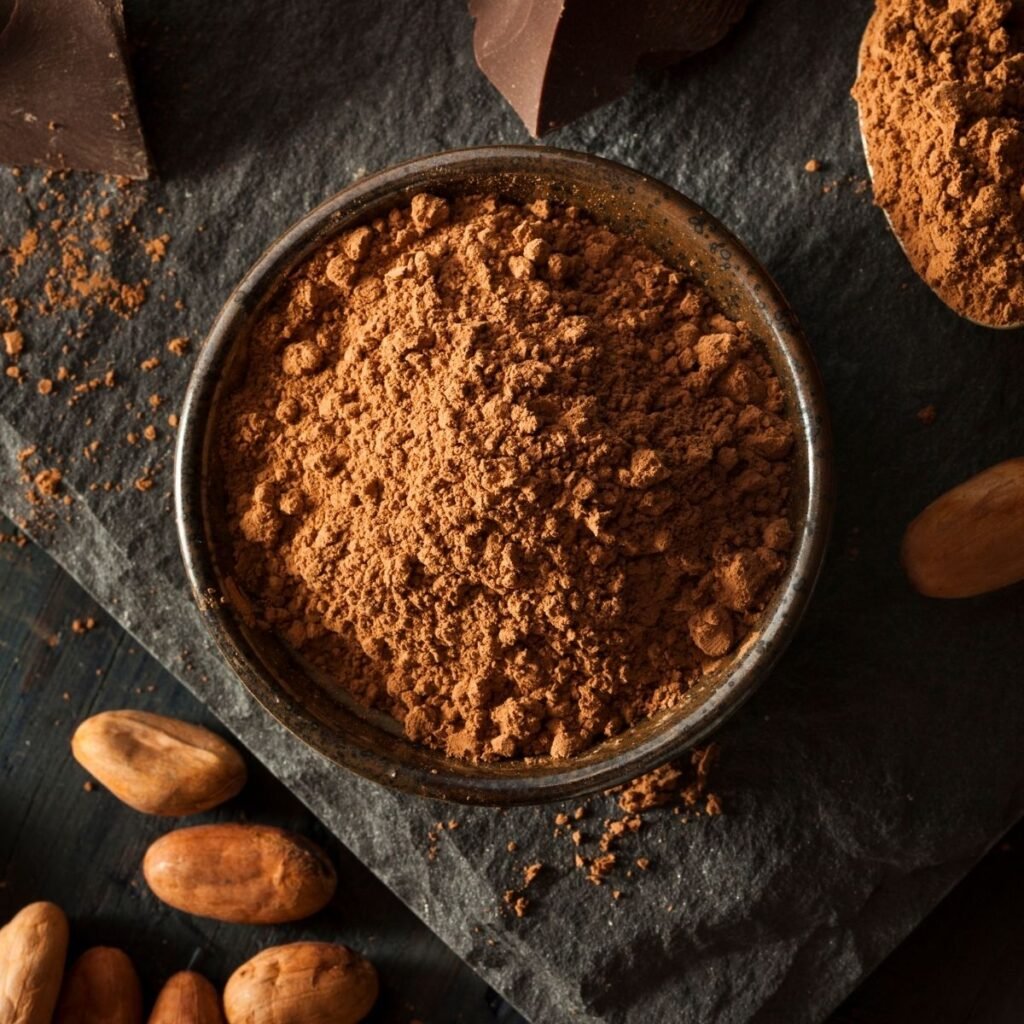
If you follow a vegan diet one of the most important things to consider are the the hidden ingredients in foods you’d otherwise think are free of animal products. Whereas milk chocolate is obviously not vegan since it has the word “milk” in it, what about dark chocolate? How about cocoa powder and cocoa butter?
In short, cocoa powder is vegan if the ingredient list includes only cocoa powder. However, not all cocoa powders are created equal, and that’s where it gets a bit more complicated. To ensure that you are purchasing a vegan cocoa powder, read on to learn more about this ingredient.
What is cocoa powder?
Cocoa powder is an unsweetened chocolate powder that adds a deep flavor to your favorite recipes.
Cocoa comes from the cacao tree that produces large pods. Inside those pods are cacao beans. Those beans produce cocoa powder and cocoa butter that is used to make your favorite chocolate products.
When cocoa butter (also called cacao butter) the fat from the cacao beans is removed, the leftover solids of the bean are processed into a powder. Cocoa powder is in essence cocoa solids.
During the processing of cocoa powder some of the cocoa butter remains. The higher quality the cocoa powder the more cocoa butter that remains in the powder.
White chocolate doesn’t contain any cocoa powder or cocoa solids. Instead it contains only cocoa butter combined with sugar and an emulsifier to help all the ingredients hold together.
Cocoa powder is not the same as hot cocoa mix. Hot cocoa mix contains cocoa powder, sugar, and dehydrated milk.
Cocoa powder is the unsweetened and unaltered solids of the cocoa bean. Therefore, by definition cocoa powder is vegan.
Is there dairy in cocoa powder?
No, there is not added dairy or milk products in cocoa powder. Just be sure that you are using pure cocoa powder and not an instant cocoa mix that is meant to make instant hot chocolate, as these contain milk powder.
It is important to note that different brands may add additional ingredients to their products such soy lecithin, or other emulsifiers.
What are the different types of cocoa powder?
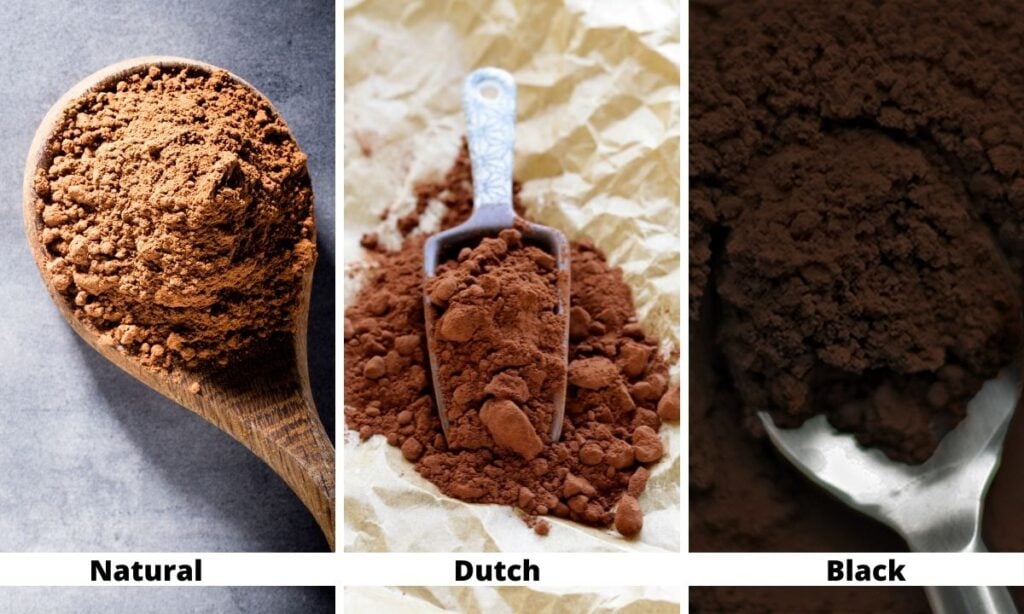
Depending on your recipe, there are three different types of cocoa powders that each serve a slightly different purpose.
Natural Cocoa Powder
The most common type is natural cocoa powder. You can easily find it in your local grocery store. When a recipe refers to cocoa powder, they are referring to natural cocoa powder unless otherwise indicated. It is less expensive than the other varieties. It is sometimes labeled as “unsweetened cocoa powder” or “pure cocoa powder.” It is rather acidic and has a strong flavor.
Dutch Process Cocoa Powder
Dutch process cocoa powder has a milder flavor. It is not as acidic as the natural variety. This cocoa goes through a second process after being ground into a powder to remove the acidity by washing it with a potassium carbonate solution. It is sometimes called “alkalized cocoa powder,” “Dutched”, or “European Style.” It has a darker and deeper brown coloring than natural cocoa powder.
Black Cocoa Powder
Mostly used for the presentation of cakes and other treats, black cocoa powder has a dark brown almost black hue. It is “ultra dutch processed” meaning that it has been washed with the alkalized solution even more to remove nearly all the acidity. It’s flavor is smooth, but it doesn’t have that distinct chocolate flavor. It is the most processed of all of the powders.
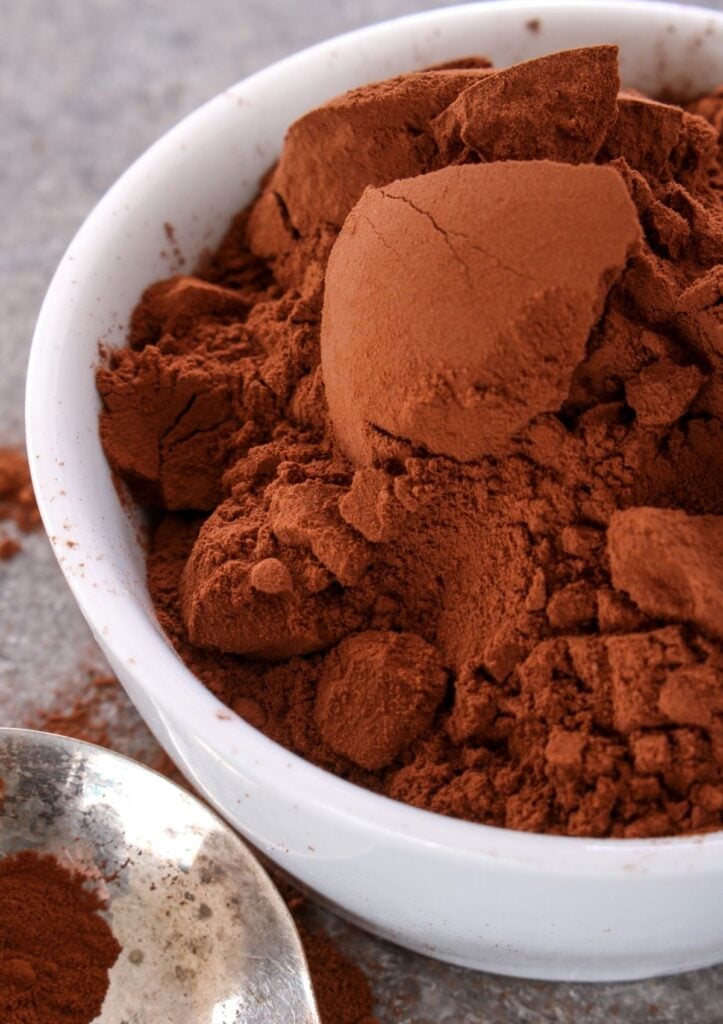
What is the difference between cocoa powder and cacao powder?
The main difference between cacao and cocoa is the temperature of the heat that is used to separate the cocoa solids from the cocoa butter from the bean itself. With cacao powder the beans are processed at a low heat. Since it is processed at a low heat it retains more of the vitamins and nutrients from the cocoa bean. As a result it is considered “raw.” Cacao powder has numerous health benefits including lowering blood pressure, reduced risk of diabetes, reduced risk of heart disease, and reduced risk of inflammation.
Cocoa powder on the other hand is processed at a high temperature to remove the cocoa butter. After that the cocoa powder is heated to super-high temperatures, which usually gives it a less bitter taste. Once the cocoa solids and cocoa butter are separated and ground, they are then heated at a high temperature to reduce some of the bitterness and acidity. As a result of this heat process cocoa powder loses some of its nutrients and vitamins, and enzymes.
Cacao is more natural. It is the pure form of cocoa and will not have any added ingredients. Most of the time natural cocoa powder also doesn’t have any additional ingredients added, however some companies will add sugar.
Where does cocoa powder come from?
Most cocoa beans (70%) are produced in West Africa in the Ivory Coast, Ghana, Nigeria, and Cameroon. Most of our cocoa comes from the Ivory Coast and Ghana (50%). Other countries that produce cocoa include Indonesia, Brazil and Equador.
Most cocoa (90%) is grown on small family farms, and only 5% is made on large plantations. The production of cocoa accounts for the livelihood of 40 to 50 million farmers.
The Problem with Some Cocoa Powder Brands
While the ingredients in cocoa powder are vegan, there are some ethical challenges when it comes to the production of cocoa powder and chocolate. If you are concerned about human rights, in the same way you are concerned about animal rights, where your chocolate is coming from should be something for you to consider.
Fair Farming Practices
The first challenge with cocoa farming is that the farmers themselves get a very small portion of the profit from the sales of the cocoa beans. While chocolate companies are making record profits, the farmers are barely getting by. Due to taxes, trading structures, and quality of beans, the farmers only receive part of the market price for the beans they sell. In addition, the world market price for cocoa has decreased even though the sales and profit of large chocolate companies have increased to staggering numbers.
Hazardous Working Conditions
As a result of these unfair farming practices the workers on the farms are under extreme hazardous conditions without fair pay. They are working under hazardous conditions handling pesticides without protective clothing, using dangerous tools, and working long hours.
The communities in which they work often don’t have clean drinking water, access to eduction, or nutritionally sufficient food.
Child Labor in the Cocoa Industry
Since farmers don’t make enough money, and the demand is high, they often end up using child laborers which reduces their overall cost.
“There are over 2 million children working on cocoa plantations in Ghana and Ivory Coast alone, more than 500,000 of them working under abusive conditions.” (Source: Tulane report 2015).
These children range in age between 5-17. These children are using dangerous tools, exposed to chemicals, and work long hours. In some cases children are trafficked and taken from other neighboring West African countries to work on cocoa farms.
The non-profit organization Make Chocolate Fair is a European campaign that helps bring awareness to chocolate farming practices. The Fair World Project is another non-profit organization that advocates for fair trade practices and fair working conditions.
How to Buy Ethically Sourced Cocoa
While the cocoa farming industry is quite disturbing when you peel back the layers, the good news is that you can buy fair trade chocolate.
Fair trade chocolate is produced ethically. The farmers are paid a fair wage, they do not use child laborers, and they have safe working conditions.
Fair Trade Cocoa
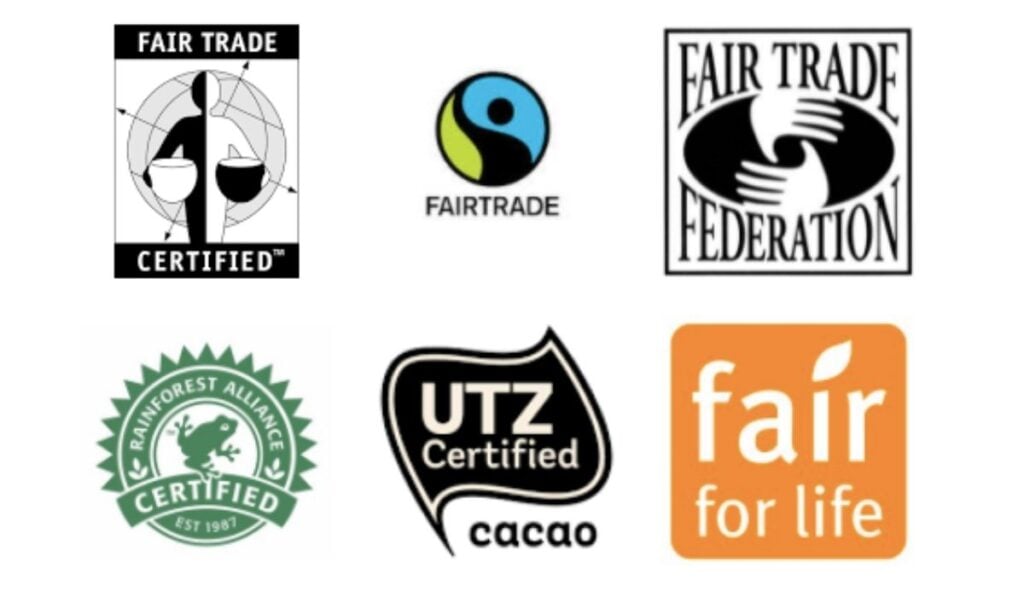
Look for the Fair Trade symbol on the chocolate you purchase, and be sure that it doesn’t have dairy products such as milk powder. Look for these same symbols on your chocolate bars, and also check the ingredient list to be sure that milk or dairy is not added. Many vegan products also display the vegan label. So look out for that as well when making your purchases.
Fair Trade Cocoa and Cacao Powder Brands
- Dutch Process Cocoa: Organic NuNaturals Cocoa Powder
- Natural Cocoa Powder: Equal Exchange Natural Baking Cocoa
- Black Cocoa Powder: Black Velvet Cacao Powder
- Cacao Powder: Navitas Organic Cacao Powder
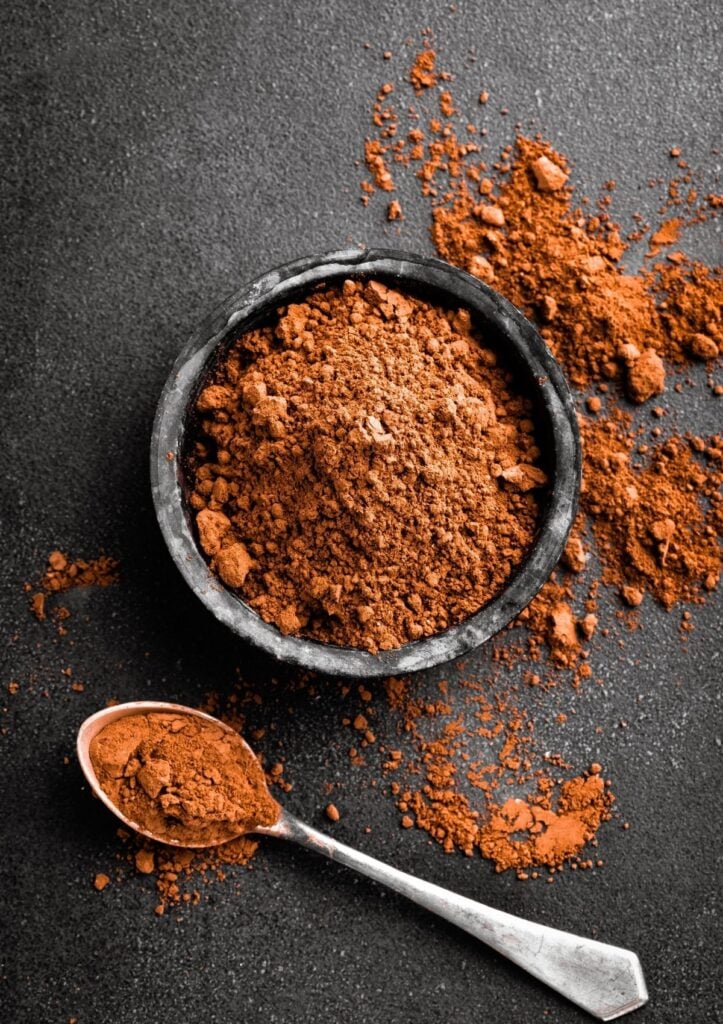
Final Thoughts
Yes, cocoa powder is vegan if other ingredients or animal products have not been added. Be sure to purchase cocoa powder not instant cocoa mix which is meant to make hot chocolate and has added sugar, and dairy.
Cocoa comes in numerous varieties. Those that are processed with an alkaline solution such as Dutch or black cocoa are less bitter. However, the more that the cocoa powder is processed the more nutrients are lost.
Cacao powder is the most pure and natural form of cocoa powder and retains the most nutrients, vitamins and enzymes. However, it also has the strongest and most bitter flavor.
While the ingredients in cocoa powder are vegan, it is important to note that the chocolate farming industry does not pay their farmers a fair price for their crop. This in turn trickles down to the workers who have to work under hazardous conditions for long hours, and often child laborers are used to reduce the cost of labor.
If you are a vegan concerned about human rights, consider buying a cocoa powder that is ethically sourced.
More vegan questions answered!
- Is cocoa butter vegan?
- Are noodles vegan?
- Are Rice Krispies vegan?
- Are M&M’s vegan?
- Vegan Oreos: Are Oreos vegan?
If you have any additional questions, please comment below. You can also follow me on Facebook, Instagram, and Pinterest for more plant-based family recipes and vegan tips.
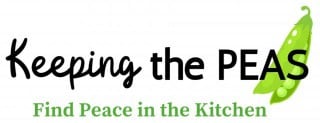

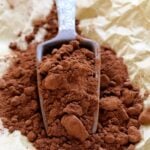
Leave a Reply